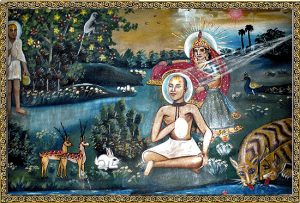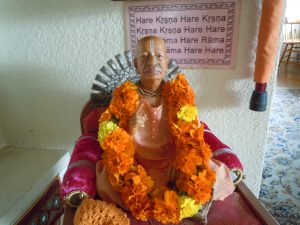“Better to be a sincere street sweeper, than a charlatan meditator”-SP
Madhya 16.237
“Be patient and return home. Don’t be a crazy fellow. By and by you will be able to cross the ocean of material existence.
PURPORT
As stated in Srimad-Bhagavatam (10.14.58):
samasrita ye pada-pallava-plavam
mahat-padam punya-yaso-murareh
bhavambudhir vatsa-padam param padam
padam padam yad vipadam na tesam
This material world is just like a big ocean. It begins with Brahmaloka and extends to Patalaloka, and there are many planets, or islands, in this ocean. Not knowing about devotional service, the living entity wanders about this ocean, just as a man tries to swim to reach the shore. Our struggle for existence is similar to this. Everyone is trying to get out of the ocean of material existence. One cannot immediately reach the coast, but if one endeavors, he can cross the ocean by Sri Caitanya Mahaprabhu’s mercy. One may be very eager to
cross this ocean, but he cannot attain success by acting like a madman. He must swim over the ocean very patiently and intelligently under the instructions of Sri Caitanya Mahaprabhu or His representative. Then, one day, he will reach the shore and return home, back to Godhead.
Madhya 16.238
“You should not make yourself a showbottle devotee and become a false renunciant. For the time being, enjoy the material world in a befitting way and do not become attached to it.”
PURPORT
The word markata-vairagya, indicating false renunciation, is very important in this verse. Srila Bhaktisiddhanta Sarasvati Thakura, in commenting on this word, points out that monkeys make an external show of renunciation by not accepting clothing and by living naked in the forest. In this way they consider themselves renunciants, but actually they are very busy enjoying sense gratification with dozens of female monkeys. Such renunciation is called markata-vairagye-the renunciation of a monkey. One cannot be really renounced until one actually becomes disgusted with material activity and sees it as a stumbling block to spiritual advancement. Renunciation should not be phalgu, temporary, but should exist throughout one’s life. Temporary renunciation, or monkey renunciation, is like the renunciation one feels at a cremation ground. When a man takes a dead body to the crematorium, he sometimes thinks, “This is the final end of the body. Why am I working so hard
day and night?” Such sentiments naturally arise in the mind of any man who goes to a crematorial ghata. However, as soon as he returns from the cremation grounds, he again engages in material activity for sense enjoyment. This is called smasana-vairagya, or markata-vairagya. In order to render service to the Lord, one may accept necessary things. If one lives in this way, he may actually become renounced. In the Bhakti-rasamrta-sindhu (1.2.108), it is said:
yavata syat sva-nirvahah
svikuryat tavad arthavit
adhikye nyunatayam ca
cyavate paramarthatah
“The bare necessities of life must be accepted, but one should not superfluously increase his necessities. Nor should they be unnecessarily decreased. One should simply accept what is necessary to help one advance spiritually.” In his Durgama-sangamani, Sri Jiva Gosvami comments that the word sva-nirvahah actually means sva-sva-bhakti-nirvahah. The experienced devotee will accept only those material things that will help him
render service to the Lord. In the Bhakti-rasamrta-sindhu (1.2.256), markata-vairagya, or phalgu-vairagya, is explained as follows:
prapancikataya buddhya
hari-sambandhi-vastunah
mumuksubhih parityago
vairagyam phalgu kathyate
“Whatever is favorable for the rendering of service to the Lord should be accepted and should not be rejected as a material thing.” Yukta-vairagya, or befitting renunciation, is thus explained:
anasaktasya visayan
yatharham upayunjatah
nirbandhah krsna-sambandhe
yuktam vairagyam ucyate
“Things should be accepted for the Lord’s service and not for one’s personal sense gratification. If one accepts something without attachment and accepts it because it is related to Krsna, one’s
renunciation is called yukta-vairagya.” Since Krsna is the Absolute Truth, whatever is accepted for His service is also the Absolute Truth. The word markata-vairagya is used by Sri Caitanya Mahaprabhu to indicate so-called Vaisnavas who dress themselves in loincloths trying to imitate Srila Rupa Gosvami. Such people carry a beadbag and chant, but at heart they are always thinking about getting women and money. Unknown to others, these markata-vairagis maintain women but externally present themselves as renunciants. Sri Caitanya Mahaprabhu was very much opposed to these markata-vairagis, or pseudo-Vaisnavas.


